The beginnings of chatbots are closely tied to customer service, and to this day, improving it remains their key function. No wonder that e-commerce quickly embraced its possibilities.
Although online stores had flirted with chatbots before, the factor that ultimately solidified their importance was the COVID-19 pandemic. Between 2019 and 2020, e-commerce’s share of global retail sales grew from 13.6% to 18% after years of steady but small growth.
Both customers and transactions were increasing, and on top of that, buyers raised many doubts regarding the products themselves, deliveries, or returns. Chatbots streamlined query handling, helping the e-commerce industry emerge from this situation unscathed.
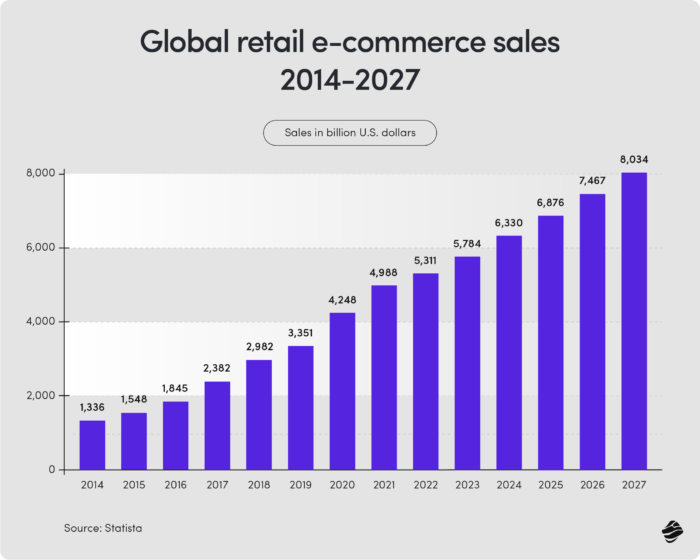
2023 brought another step forward in the evolution of chatbots. The rise of GenAI showed us that interactions with artificial intelligence can be natural, enjoyable, and effective. Generative artificial intelligence not only improves routine chatbot support but also opens up new potential use cases for e-commerce stores – giving them superpowers that transform the shopping experience.
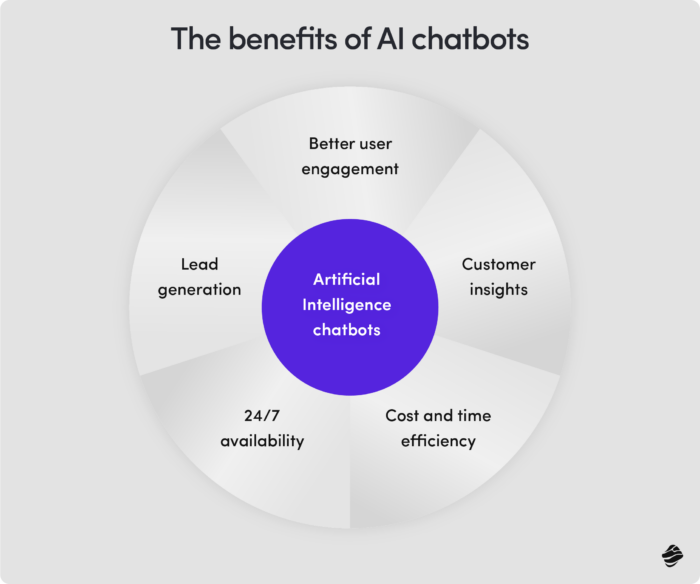
Join us as we explore the digital evolution of retail, where chatbots have emerged as the strategic heartbeat of e-commerce, orchestrating seamless customer interactions.
How to use chatbot for eCommerce – key functionalities
eCommerce is a perfect ground for chatbots to prove their various capabilities. Once mainly used for customer service, today, they fulfill the entire range of functions, transforming into a true one-man band – your dedicated assistant who understands exactly what you want and need.
Product info base
Thanks to integrations, eCommerce AI chatbots can access information from PIM systems, ERPs, product specifications, instructions, and other data sources. Based on LLM, they can accurately and directly answer customer queries regarding product usage, maintenance, warranty, or composition. It’s like having a superbrain among your eCommerce app features!
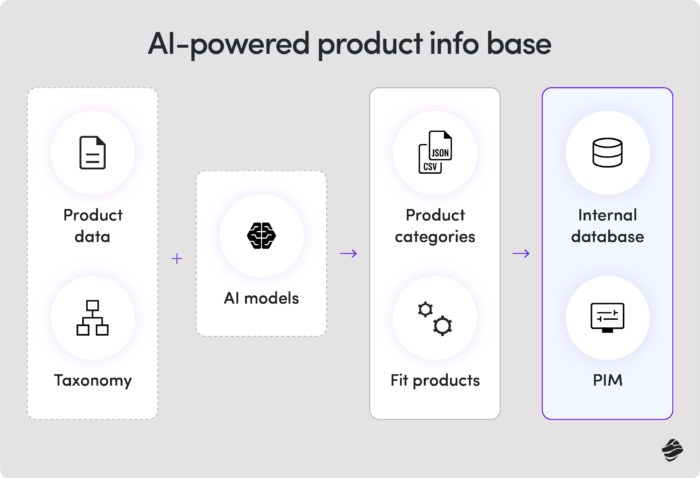
Personalized Recommendations
Ever dreamt of having a personal shopper? GenAI chatbots may not bring the purchase home, but they understand your client’s style like no one else. Analyzing their shopping patterns and browsing history, they will provide custom recommendations that customers won’t resist! Plus, they’ll use upselling and cross-selling opportunities you could miss the other way around.
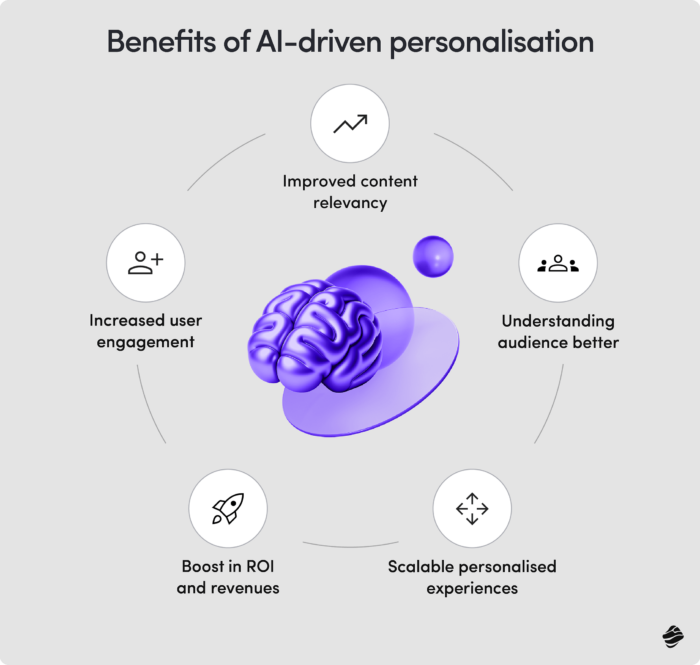
Shopping Assistance
With GenAI superpowers, chatbots can creatively respond to prompts, adjusting their recommendations to the occasion. They pave the way for a successful purchase, taking over a part of the customer’s thought process.
Instead of specifying what they’re looking for, a client can say, “I’m going to Lisbon for the WebSummit and need three outfits.” Based on weather forecasts, event character, and shopping preferences, the chatbot will propose a suitable set.
24/7 Customer Support
Maintaining a 24/7 customer support department is costly when you can engage chatbots instead. They’ll respond to customer queries and provide support in various situations, offloading the customer service team.
A customer returned their pair of shoes, but hasn’t received a refund? The audio set they ordered is incomplete, and soon, they’re hosting an important event? Chatbots will handle these issues, only passing the customer to a live consultant when unable to assist.
They’ll also guide the customer through the checkout process, apply discounts, and resolve payment issues. Alongside good UX, it’s the best defense against abandoned shopping carts!
Product Search and Discovery
GenAI chatbots are changing how we search for products, enabling us to use natural language and long phrases with successful outcomes.
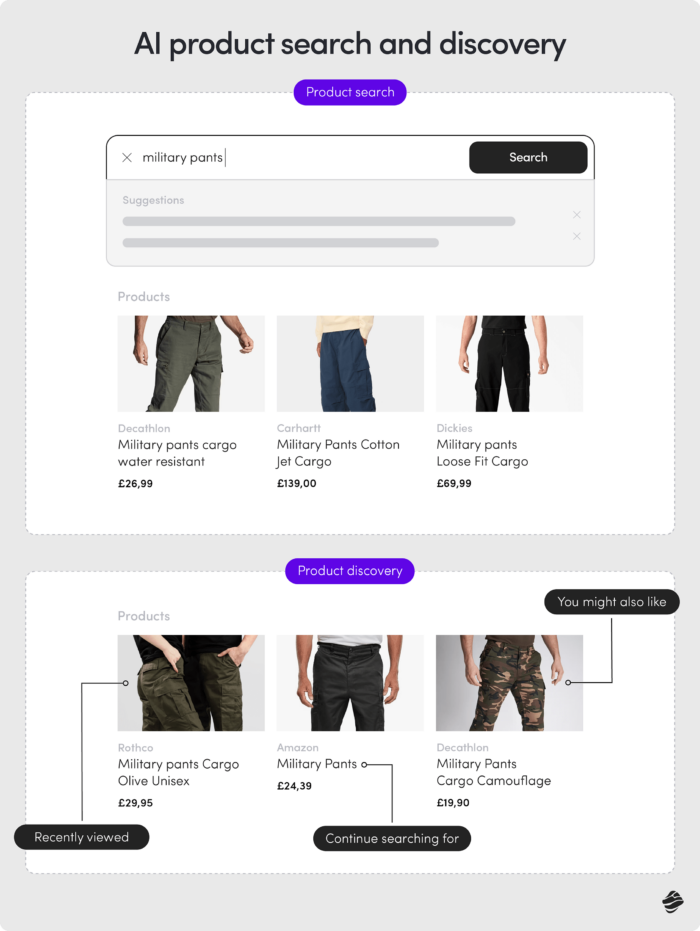
Imagine a customer searching for a pair of pants they saw on social media. The model is known as cargo pants, but they’re not familiar with the term. An intelligent chatbot will be able to suggest the right product based on their descriptive prompt (shape, color, length, season). Sales opportunity saved, and a loyal customer acquired!
eCommerce AI chatbots and their impact on driving customer engagement
For a shop employee to leverage sales opportunities as effectively as a chatbot, they would need to ask a thousand questions. The chatbot doesn’t have to. It already knows what a particular customer likes, what motivates them to purchase, what their triggers are, what their plans are, and what they’ve recently searched for online.
This knowledge, further enriched by input from the current conversation, can serve for maximizing the value of the shopping cart and increasing the likelihood of a purchase. And when necessary, the chatbot can transform into a full-fledged shopping assistant, drawing on user input and user data.
In the era of ChatGPT, where we’re already accustomed to interacting with generative artificial intelligence services, chatbots are no longer risky engagement-wise. And, if well-trained, they can cause engagement metrics to skyrocket. Plus, the user knows they can rely on it at any time of day or night. This pays off!
eCommerce AI chatbots and their role in driving operational efficiency
A well-designed chatbot frees employees from many labor-intensive tasks while simultaneously benefiting multiple departments. The customer service department benefits the most, as it can focus on solving complex issues thanks to this relief. The chatbot handles the more routine tasks, resulting in inquiries being addressed more quickly.
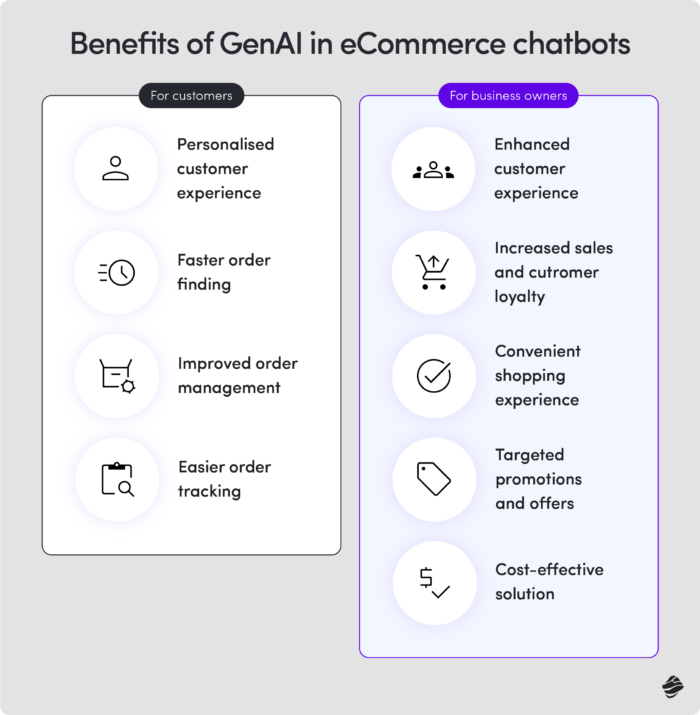
But that’s just the icing on the cake! By collecting and processing customer input into systems (such as CRM), the chatbot streamlines the work for analysts, salespeople, marketers, and customer success teams. For all of them, data can be real gold if properly processed and captured. Often, there isn’t enough time for this during manual work – and AI chatbots for eCommerce solve that problem.
Integrating AI and Gen AI chatbots for eCommerce into existing platforms
Popular eCommerce platforms allow integration with ready-made chatbots as well as dedicated solutions. In the case of Magento, you can use Dialogflow Connector or IBM Watson Assistant or connect via API to your dedicated solution. Similarly, with Shopify, you can integrate with a custom chatbot or use ready-made apps (Tidio, Gobot, Chatra). The same goes for WooCommerce, Salesforce, and other platforms. It’s up to you!
How to use chatbot for eCommerce, if you go custom? Just follow the well-beaten path. Once you have your custom chatbot designed and trained, all you need to do is obtain API credentials, write code for integration, and implement the chatbot functionality into your platform. Then test, deploy, and you’re ready to chat!

You can leverage Miquido AI Kickstarter as a springboard to success. Our framework empowers you to develop personalized, reliable, and context-aware AI applications with greater scalability, being 3 times faster and 50% more cost-effective than traditional methods.
What should you integrate your eCommerce chatbot with?
Chatbots are versatile, but they aren’t clairvoyants – to fulfill the functions described above, you should feed them data from various sources. They should also have access to different systems in real time. That, of course, requires integration. What should you integrate your chatbot with?
CRM
Integrating with a customer relationship management system will allow the chatbot to provide personalized responses based on past interactions and customer data. Simultaneously, it can automatically gather customer information based on conversation input and pass it to the system, where it will be processed and cataloged. The chatbot can refer to this information and avoid making “faux pas” by unnecessarily asking about issues that have already been addressed in the past.
Order Tracking Systems
To provide information about the status of orders, the chatbot should have access to order tracking information. You can establish it through third-party APIs of logistics companies and shipping carriers you collaborate with. Confirmation emails can also serve as a source of information for the chatbot.
Payment Systems
Integration with payment systems will enable the chatbot to process payments and provide support in case of transaction issues. This allows customers to make purchases directly through the chatbot, potentially increasing conversions and improving the user experience.
eCommerce Chatbot use cases – how do others do it?
Nothing motivates as much as a good example! Here are some generative AI business use cases that set examples for the industry.
Zalando shopping assistant
The fashion industry, as one of the first, recognized the potential of generative AI development, with Zalando being a pioneer in this field. This German shopping giant has never hidden its affinity for technology, advocating for advanced product recommendation systems and size advice in fashion eCommerce.
Now, they have taken a step further by creating a shopping assistant based on ChatGPT. This will allow users to forget about the dozens of filters they have to painstakingly adjust to their preferences and search for appropriate words, which are often redundant. After all, terms like “gothic” or “vintage” can mean different things to different people, and not everyone remembers the names of specific clothing or footwear models.
During conversational interactions, the Zalando assistant will suggest outfits for specific occasions, advise on which products from the range will best complement items already owned by the customer, or create sets from different price ranges for a weekend city break, taking into account the predicted weather.
And much more! By asking follow-up questions about favorite colors, textures, styles, etc., it will find the sweet spot, guiding the customer towards a purchase and leaving them happy. Applying a test-and-scale approach, Zalando is continuously refining the assistant based on customer feedback to prioritize trust and satisfaction.
Lego chatbot
If you’re not an absolute LEGO fan, entering the store’s website might overwhelm you – not so much with the variety of colors as with the spectrum of choices. Your nephew is supposed to find a new set of bricks under the Christmas tree, but what to choose here? Which sets are suitable for his age, and which match his preferences?
LEGO recognized that implementing a chatbot would be a great solution to this problem, and they hit the mark! The effect was impressive: according to the Edelman case study, chatbot Ralph generated an 8.4 times higher conversion rate and a 65% lower cost per purchase than other conversion-based ad formats (such as carousels, Canvas, and collections).
Undoubtedly, the unique tone of voice played a role in its success – Ralph is as playful and creative as LEGO’s creators.
Miquido’s AI chatbots for eCommerce
As an AI chatbot development services provider, we also have some chatbot success stories up our sleeve! AI powered Customer Service chatbots developed through our Miquido AI Kickstarter framework decrease repetitive queries by 25% and makes response times 5x faster.
Just imagine how much savings it could mean. With 50 languages supported, they prepare any e-commerce business for international presence. If you’re wondering how to use a chatbot for eCommerce to generate maximum profit, our framework could be an answer.
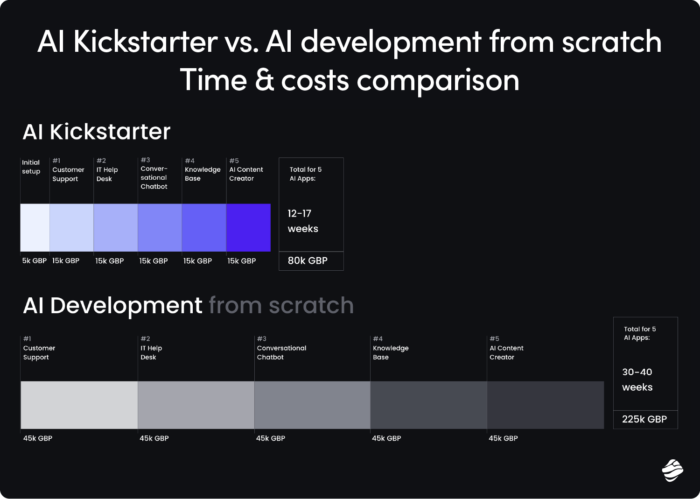
Future trends for AI and genAI chatbot in eCommerce
Which AI trends in mobile apps and web will we see unfold in the following years? Although awareness regarding the functioning of chatbots is increasing, in the coming years, companies will emphasize implementing guidelines, standards, and regulations to govern chatbot interactions and prevent harmful or unethical outcomes.
In the case of e-commerce chatbots serving specific tasks, the risk of misconduct is lower but still exists. Through a transparent approach and education on potential AI biases, companies can promote responsible AI use, avoiding so-called “jailbreak prompts” and similar techniques aimed at bypassing training restrictions.
Multimodality of eCommerce AI chatbots
With time AI, chatbots for eCommerce will become more and more multimodal, handling various types of input. So far, companies have focused on polishing their natural language capabilities, but, over time, the ability to work on different sources – images, videos, audio recordings, etc. – will become crucial for chatbot users.
eCommerce will become a leading driving force of this trend, investing in multimodal capabilities. Clarifying search queries or describing product issues can be difficult for users due to a lack of nomenclature. A multimodal GenAI chatbot will not require them to describe the problem – just uploading a recording documenting a technical issue or a photo of a defect will suffice. And if they’re looking for a product – a relevant screen capture will do.
The evolution of interaction techniques in eCommerce AI chatbots
The interaction techniques will evolve as the versatility of eCommerce chatbots increases. What are chatbots, after all? Naturally, we tend to think about them as an entity closed in the chatbox. However, over time, AI assistants will expand all over the interface, making the whole experience much more engaging.
iFetch, a Farfetch project carried out in collaboration with CMU and FCT Nova, illustrates this trend very well. The high-end eCommerce fashion leader is introducing an AI agent adopting the role of a fashion concierge, turning a typical chatbox into a whole virtual room where the user can explore the products in 2D or 3D and try out their different combinations.
How AI-powered chatbots are shaping eCommerce experiences: the summary
eCommerce chatbots are evolving at lightning speed, dishing out personalized tips, smoothing out shopping trips, and being there 24/7 for all your customer support needs. Seamless integration with existing e-commerce platforms is key, allowing chatbots to access real-time data and systems for personalized responses, order tracking, and payment processing, ultimately enhancing the overall user experience.
Looking ahead, the future of chatbots in e-commerce hinges on responsible AI practices and expanding their capabilities to handle diverse inputs, ensuring they seamlessly integrate across interfaces for a truly engaging user experience.
If these ecommerce chatbot use cases had you inspired, let’s talk! As an experienced eCommerce app development company with extensive expertise in genAi, we can multiply your benefits from such implementation.







